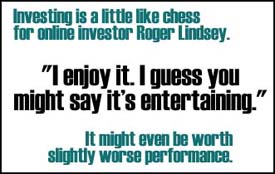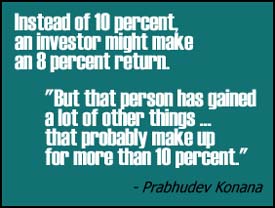|
Online trading's fun factor
|
 |
November 1, 1999: 11:35 a.m. ET
Investors may give up returns for other rewards when they trade online
By Staff Writer Alex Frew McMillan
|
NEW YORK (CNNfn) - To Roger Lindsey, a mail-sorting clerk with the U.S. Postal Service, investing online is like a game of chess. "I enjoy it. I guess you might say it's entertaining," he said.
Wary of warnings that online trading is little more than slapping your chips on red, he's quick to say it's not a trip to Vegas. But he might be willing to sacrifice a little of his return -- something that experts believe happens when investors trade actively -- for the privilege of having succeeded in the market on his own.
"If I were doing worse, I'd just write it off as a cost. Because I have much more satisfaction now," he said. "The fun part of my account is my online account."
The Simi Valley, Calif., resident used to place around two trades a quarter through the three full-service accounts he's had in 20 years of investing. But when he left PaineWebber and went online with what's now TD Waterhouse, that rose to twice a month.
That's typical. Investors who start trading online normally step up their activity.
But by trading actively, people get annual returns roughly 2 percentage points below what they'd get with a long-term buy and hold strategy, according to Terry Odean, a professor at the University of California at Davis. He and a colleague have studied the perils of increased trading, and online trading in particular. Investors that outperformed the market by three percentage points before they went online lag it by two points afterward, thanks to active trading, they found.
Lindsey doesn't think he has dented his returns with his trades. But even if he has, he says it wouldn't matter. Maybe he would adjust his strategy if he knew that for sure. But he certainly isn't going back to a full-service broker or giving up online trades.

Why do investors trade online? And what do they get out of something fast approaching a new national pastime? While not quibbling with the idea that investors tend to perform worse through frequent trading when they open online brokerage accounts, a new study from three Texas business professors states that money isn't everything.
"Instead of a 10 percent return, they might make an 8 percent return. But that person has gained a lot of other things, knowledge accumulation, control, that probably make up for more than 10 percent," said Prabhudev Konana, an assistant professor in the Graduate School of Business at the University of Texas at Austin who co-wrote Understanding Online Investors: An Analysis of their Investing Behavior and Attitudes.
In short, investors might be slightly worse off, but they're happy, maybe learning something, and that's what's important.
Konana and the other authors polled more than 800 investors using the Web site of a major online brokerage they agreed not to name. They surveyed the investors to see why they traded and how happy they were.
Investors that "play" online
Like many investors in the survey, Lindsey says he gets a lot of satisfaction from investing. He has become much more wrapped up in his finances after going online.
Lindsey, 46, works at night, so he's free to make his trading decisions during the day. In fact, many of his colleagues do the same. For instance, he says how his supervisor treats his co-workers depends on whether she has had a good day in the market or a bad one.
He used to sit back and pay little attention to stocks, relying on his broker instead. But now he subscribes to several investing newsletters and cites financial TV stations as among his favorite.
Lindsey went a little hog wild when he first went online. He's slowed down now, because he has to make a down payment on a house in a few months and he no longer wants to risk as much money. He's also cautious about the market, and online investing isn't as much of a novelty.
Lindsey cites his tax returns, showing he has made more money investing in recent years. But they, of course, don't compare how the stocks he sold did against those he bought, his potential performance with his actual performance.
He might be willing to accept worse numbers. The "fun" part of his account amounts to 30 percent of his savings that he has set aside for self-directed, speculative online trading. The rest sits in retirement and savings plans, mainly in mutual funds.

That's often the case with investors, who frequently take part of their portfolio online and "play with it," according to Konana's study.
As you'd expect, dissatisfaction with full-service brokers was high -- half the investors complained of bad treatment. They got very mad when a broker gave them bad advice. And they took it in stride when they did well. The opposite applies when they're investing for themselves -- investors chalk their own success up to their smarts and their failures to bad luck. Or people feel "At least I made the decision myself."
Other findings were more unusual. Contrary to the picture of online investors as tech-savvy and educated, more than one in three don't have four-year college degrees. For people who have most of their portfolio online, almost one in four, 22.4 percent, only have high-school diplomas.
Investors that were embarrassed placing small orders of stock through a broker now feel free to trade five shares of Dell. They also don't feel as though they need to justify their decisions any more. For the people who had the most of their portfolio invested online, a full-service broker was too expensive. Online trading "gives them an immediate chance to participate in a market that was limited to only a few in the past," Konana said.
Investors that are "playing" online feel gratification if their investments perform well, enjoy the feeling of control -- illusory or not -- and may learn how the markets work, Konana said. All of which makes up for worse returns.
"Over time, when investors become more aware of how things work, they will become better traders. They'll find out frequent trading doesn't work. And they'll be more cautious," he said.
Perhaps poorer performance is worth it
Philip Ross, a retired defense engineer with Rockwell International who lives in Fullerton, Calif., agrees that taking over his investments has reaped benefits beyond returns.
"It's entertaining. When you invest in the stock market you get all the elements of life," Ross said. "You learn about the world. You learn about business. You learn about people. You learn about yourself. There's a bit of gambling to it if you will."
He used to use a broker, but has switched to online accounts with Charles Schwab and Fidelity. "It drove me nuts that someone else was making all the decisions," he said. "Someone else is controlling your destiny, and I didn't like it." He started with mutual funds and moved gradually to investing in stocks.

The basic problem is that people trade too often without thinking trades through, he thinks. He hasn't compared how he's doing with how he would have done by leaving his portfolio alone, but he can believe he might give up a little in performance.
It's worth it, he says. He meets with his friends to discuss stocks and he pores over newsletters to make his decisions. Investing on his own is fun. But how worth it is it? "You couldn't put any money category on it. It is worth quite a bit to me," somewhere less than five percentage points. "Five percentage points is quite a lot when I think about it."
We all like to believe we're in control
One of the driving factors that would explain why online investing has taken hold quickly is that it plays into human biases. We do feel a greater control over our lives if and when we take over our accounts. And the enjoyment may be important factor in our happiness, whether we're really responsible or not, said Robert Eisenberger, a psychology professor at the University of Delaware who specializes in human motivation.
An up market only reinforces that. "People see themselves making money, they take that money to be a real signal of their talent and success," he said. He's sure very few people realize or even stop to work out if they're giving up two percent in returns by selling good performing stocks and replacing them with worse ones.
Instead, as long as their portfolios increase, they attribute their successes to their smarts and research, and any failures to bad luck. "It's just like Lake Wobegon [the fictitious town of a popular radio show] -- every trader is above average."
The satisfaction or "value" of a self-directed account versus a full-service one may be a little like how we react to brands, said Sridhar Balasubramanian, an assistant marketing professor at UT Austin and a co-author of the report with Konana.
Think of drinking a soda, he said. You may be happy when it comes in a red can with Coke written on the side. But give someone black liquid in an unmarked white container and they won't get the same pleasure. The same with investors. "They think they have control. They feel they're doing well. And they're happy," Balasubramanian said.
Maybe ignorance really is bliss, the cynical would suggest. The Texas professors think investors gradually learn to trade better. But other psychologists suggest experience and all the research and newsletters we can muster create overconfidence.
Odean, the UC-Davis professor, said investors can always find excuses -- a different economic situation, different stock-specific news, and so on. "It's a very noisy place to learn, the market," he said. Unless you're very unlucky, it would take a long time trading and careful record keeping to work out they were doing worse online than they did through the phone or with a conventional broker.
He still thinks investors would be better off investing in index funds and low-cost mutual funds than in stocks. But if investors want to take 10 percent of their portfolio and play online, fine, he said.
His colleague, Barber, said the central question is, literally, whether online investors know what they're doing. "While some investors trade for entertainment -- that is, they knowingly hurt the investment performance because they enjoy the experience of trading -- we believe that many investors unwittingly hurt their performance by trading."
With lower commissions, you win online if you resist the urge to place more trades. "If you're placing exactly the same trades that you would have otherwise, you can't be worse off," Odean said. 
|
|
|
|
|
 |

|

